


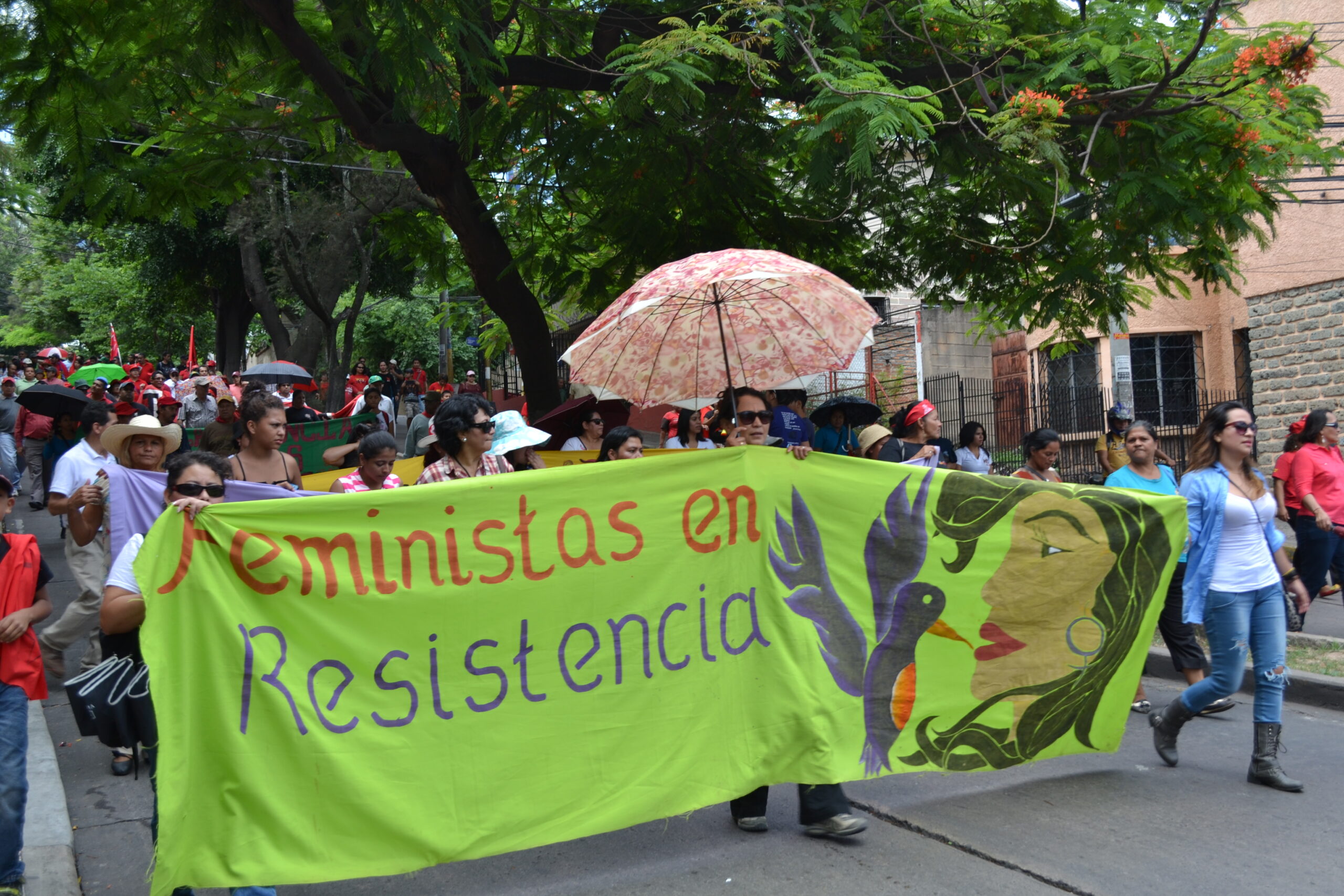
Every June 28 gets its November 28: that was the phrase that was popularly used to describe what happened in Honduras last November 28, when the Honduran people, full of a stubborn hope born of resistance, went to the polls and voted to kick out the dictatorial regime that began that fateful June 28, 2009.
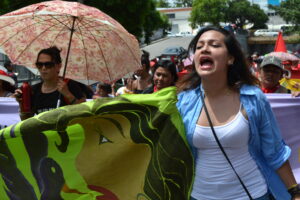 I remember that day (June 28) as if it were yesterday: the formation of military planes flying over the city, the disbelief of experiencing a coup in the 21st century, the first of several in the region and the world, and our outrage facing an event we thought was impossible. Outrage and naiveté made us go out into the street and there, on the streets, we joined a river of people who shared not only that indignation, but also the desire to save a Honduras submerged in a dictatorship. All kinds of people came out into the streets of Tegucigalpa: housewives, street vendors, business women, journalists, youth, neighborhood groups, the LGBTI community — all expressions of an outraged citizenry. Together, we stood in front of the presidential house, surrounded by soldiers and war tanks stationed on the premises. That image would be the harbinger of many years stained with blood. There, from the first day, in the middle of the mobilization, we were the ones who, a few minutes later, would call ourselves Feminists in Resistance or the FER as they called us.
I remember that day (June 28) as if it were yesterday: the formation of military planes flying over the city, the disbelief of experiencing a coup in the 21st century, the first of several in the region and the world, and our outrage facing an event we thought was impossible. Outrage and naiveté made us go out into the street and there, on the streets, we joined a river of people who shared not only that indignation, but also the desire to save a Honduras submerged in a dictatorship. All kinds of people came out into the streets of Tegucigalpa: housewives, street vendors, business women, journalists, youth, neighborhood groups, the LGBTI community — all expressions of an outraged citizenry. Together, we stood in front of the presidential house, surrounded by soldiers and war tanks stationed on the premises. That image would be the harbinger of many years stained with blood. There, from the first day, in the middle of the mobilization, we were the ones who, a few minutes later, would call ourselves Feminists in Resistance or the FER as they called us.
The FER were a group of feminist women who came together in the heat of the street, against the military and civil powers that surrounded us in the context of the coup d’état. We strongly believed that what we saw was a violation of democracy and that went beyond defending the president who had been overthrown, and involved defending the democratic social pact itself. We also warned that the installation of a dictatorship would bring with it enormous setbacks in the lives of women. And as an example: The first thing the coup legislature did was to issue a decree prohibiting the sale, distribution and promotion of the emergency contraceptive pill. That’s right, since then and until now, the ECP is prohibited in Honduras, a clear signal that we women and our bodies and our rights are seen as currency of political exchange.
The FER were in the streets every day in that period following the coup of June 28, together with the Honduran people, to reverse the coup through grassroots mobilization. There, in the streets with everyone else, we created a safe place for the other women in the resistance. Many times women of all ages approached us to denounce cases of harassment from fellow members of the Resistance that they suffered in the midst of the mobilizations. We sometimes responded spontaneously and even irresponsibly to the paradox of finding ourselves in search of a better world and realizing that violence against our bodies and our lives continues to be such a normalized act even among our peers. Of course, we protected ourselves from those aggressions, but they lost urgency in the face of the horror of the state repression that we experienced in those months. The regime orchestrtated cruel and furious repression against women’s bodies that included rape as a weapon of war against the women of the resistance, violence that sought to punish us for our disobedience and for being outside the house. In any case, we knew that no aggression was justifiable and that there was a lot of work to do when it came to our rights.
I clearly remember being in the middle of an attack in front of the National Women’s Institute, where soldiers attacked our bodies with all their hatred and in the middle of the repression, a group of fellow protesters arrived to support us and provide reinforcements. In the middle of the gasses and the blows I heard them say: You cowards, how dare you come to hit our women, only we can do that.
Although those were very hard times, the community gave us immeasurable strength that led us not only to accompany these cases, but also to organize ourselves better for meetings, to contribute in whatever way we could to achieve a return to democracy.
The FER contributed to the popular Resistance not only with our bodies in the streets, but also providing documentation of the multiple aggressions that we experienced in the streets. By generating rigorous data, we had facts that could be used as evidence before different international bodies.
We also contributed to the organization of demonstrations in which, based on our analysis, we built strategies for the benefit of women in the resistance. We distributed condoms and information on the use of ECPs, and distributed information on where to go if you suffered violence since we knew the police would not be an option right away. Some of us became legal advocates to support each other in the face of the incarceration and criminalization we faced while others turned to attending to immediate needs.
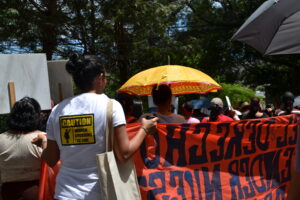 The FER brought all our international alliances to the resistance, which contributed to breaking the media siege imposed by the dictatorship and its allies at the local, regional, and global levels. Through “Las Petateras” (a regional network promoted by several organizations in Central America in which JASS and other organizations worked intensively, at the time), we organized an Observatory of Feminist Transgression in the first months of the resistance. This was a delegation of prominent women and feminists with key positions at the regional and international levels who met with the “compañeras” and “compañeros” of the resistance. They talked to Xiomara Castro, among others, and with some national authorities to request information and then pùblish a report that reached the Organization of American States regarding the human rights violations that we were facing.
The FER brought all our international alliances to the resistance, which contributed to breaking the media siege imposed by the dictatorship and its allies at the local, regional, and global levels. Through “Las Petateras” (a regional network promoted by several organizations in Central America in which JASS and other organizations worked intensively, at the time), we organized an Observatory of Feminist Transgression in the first months of the resistance. This was a delegation of prominent women and feminists with key positions at the regional and international levels who met with the “compañeras” and “compañeros” of the resistance. They talked to Xiomara Castro, among others, and with some national authorities to request information and then pùblish a report that reached the Organization of American States regarding the human rights violations that we were facing.
With JASS’ support, the FER organized the first visit of the women Nobel Peace Prize winners to the country. They joined us at the national level, listened to us and met with the president at that time, Porfirio Lobo Sosa, to ask uncomfortable questions about the situation in which we women lived. With the strategy of breaking the brutally imposed national media siege, the presence of three women Nobel Peace Prize winners proved difficult to ignore, especially accompanied by high-level representatives of the international press. Sometimes it seems that such a strategy does little or nothing. But in Honduras the media allies with the visible powers of the dictatorship and bent on proving that if you repeat a lie a thousand times, it becomes a truth, so disrupting that narrative and highlighting the real experience of the people is transcendental to be able to disrupt and sow the seed of the doubt.
Convinced of this in 2014, for example, we invited Alda Facio to Honduras in her capacity as an expert on CEDAW, to join the CEDAW Platform who were seeking – and continue to seek – the ratification of the optional protocol of this important international instrument. We were absolutely convinced of the integrality of the struggles and thanks to an alliance with some deputies, Alda was invited to speak in the plenary session of the coup National Congress, a body already co-opted by the dictatorship. That same day in the morning, they murdered our colleague Margarita Murillo, a human rights defender and social leader, one of the country’s longest-standing social activists — a member of the peasant movement, promoter of justice and equity in land and human rights of the rural population. We received the news on the way to Congress with Alda with us in the car. In the plenary meeting of the coup and dictatorial congress, the first thing Alda did when she spoke was to ask for a minute of silence for Margarita Murillo, honoring her legacy before the representatives of the darkest forces in our country, and on national television.
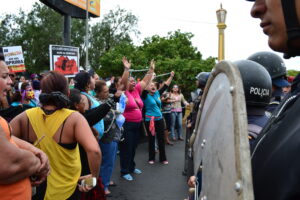
With the aim of contributing to the consolidation of a new pact, the FER participated in the coordination of the National Popular Resistance Front. Invaluable experienced feminists and young people full of desire to contribute to the Resistance stepped up to join diverse sectors of the country (mostly men) and accompany the Honduran people in the search for a return to democracy. Not only were we part of the coordination of the front, but we managed to have this space declared an anti-patriarchal space and we supported the anti-capitalist and anti-racist declarations. Although it was only a declaration, for us it represented a great triumph given what we were facing in the streets, because we worked in a context where the most privileged places of the resistance were still reserved for men and we showed our determination to change that.
National Front of Popular Resistance, a necessary coalition, was divided between those who pursued a return to democracy through a political arm and those who pursued the return through a new, popular national constituent assembly that would allow the refoundation of the country. Of course, in these lines I cannot do much more than simplify the story and all that this divergence meant for the Resistance, but that is where the “Libertad y Refundación” party was born–LIBRE– and its political alternative – The Refoundational Space, leaving the national front of popular resistance in the background.
In the midst of such internal complexities, FER did not escape these contradictions and some “compañeras” joined the LIBRE initiative and others joined the refoundation space. But no one renounced the construction of a Honduras, different from the project of death that we saw taking hold more and more.
Honduran women and feminists have fought every day for the last twelve years in very different ways, but we have never given up. We have formed alliances with territorial resistance and we have some deeper relationships with members of other organizations and movements. From JASS, we have accompanied and facilitated Popular Feminist Education training processes to strengthen women in these movements and strengthen ourselves. Along with our allies, we founded a National Network of Women Defenders that in its beginnings was made up exclusively by and for feminists, but that later, given the atrocity of the situation, was expanded to include all defenders.
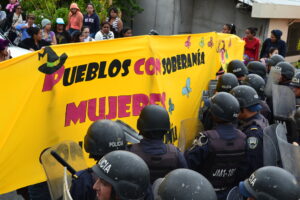
We feminists in Honduras continue in the tireless fight to lift the ban on ECPs and for that we come together in organizations such as “Somos Muchas” and GEA ECP. Honduras registers the second highest rate of adolescent pregnancy in the region and more than 200 rapes are reported per year. We also have supported the emergence of movements and organizations, such as those outraged at the corruption. We show solidarity with the various territorial struggles, we join the student struggles and we reinvent ourselves in spaces such as the “Femiñangaras”, a group that formed to claim the rights of women in Tegucigalpa again, in the midst of the protests against electoral fraud, especially in 2017. We organized The November 25 Platform to take to the streets every January 25 and November 25, despite knowing that repression was the only thing we could expect from the regime–to make our own agendas and to allow us to dream together of a different Honduras.
We feminists in Honduras embrace the “compañeras” of “Luchemos” and “La Revuelta Feminista”, who bravely declare themselves as young feminists organized in the “Partido Libertad y Refundación (LIBRE)”, and expressions such as “La Revuelta Feminista de LIBRRE” that have collectively built a sisterly participation within the party that gave us the first woman president in the history of Honduras and a new government that more closely reflects our diversity and resistance.
In conclusion, Honduran feminists in our wide diversities have made significant contributions to the commitment to democracy. We have never stopped resisting, even while living through these twelve horrible years of dictatorship that have looted and dispossessed public resources and life in every way. We still do not have it easy, since reconstruction requires an entire country and the aftermath of the dictatorship still inhabits our society. So much so, that although the ban on the morning-after pill was one of the first decrees to be approved, it was not the first to be implemented, although it fully depends on an executive ban. The health minister said he has other priorities – honoring the coup tradition of denying women’s rights and recycling patriarchy even within the framework of a progressive government.
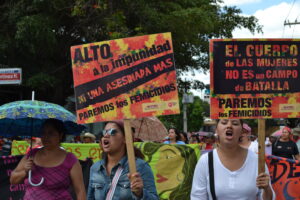 Despite this, this June 28 is commemorated in a different way throughout the country, thanks to the stubbornness and hope of a people who decided to take to the streets and not give up–even if it took them thirteen years to try to rewrite their history. This victory belongs to everyone, but from no point of view has it been gratuitous. This achievement is the product of all the years of the Honduran people’s resistance, a resistance with a feminine face and made up of feminists like Margarita, like Berta — and so many — we will not be able to name them all, but they have been at the center of building our road to democracy.
Despite this, this June 28 is commemorated in a different way throughout the country, thanks to the stubbornness and hope of a people who decided to take to the streets and not give up–even if it took them thirteen years to try to rewrite their history. This victory belongs to everyone, but from no point of view has it been gratuitous. This achievement is the product of all the years of the Honduran people’s resistance, a resistance with a feminine face and made up of feminists like Margarita, like Berta — and so many — we will not be able to name them all, but they have been at the center of building our road to democracy.